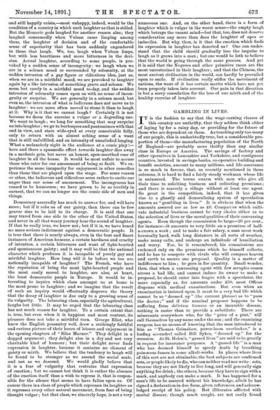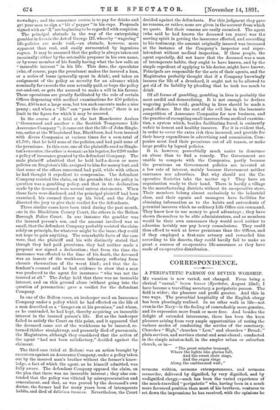GAMBLING IN LIVES.
IT is the fashion to say that the wage-earning classes of this country are unthrifty, that they seldom think either of laying by for a rainy day, or providing for the future of those who are dependent on them. As touching only too many of our people, this is undoubtedly true, but a considerable pro- portion of them—the manufacturing population of the North of England—are probably more thrifty than any similar class in Europe or America. The savings of factory and other operatives in Lancashire and Yorkshire, and contiguous counties, invested in savings-banks, co-operative building and benefit societies, amount to many millions, and life-assurance is so much in favour, that, as recently mentioned in these columns, it is hard to find a fairly steady workman whose life is uninsured. The towns swarm with men who give all their time to soliciting business and collecting premiums ; and there is scarcely a village without at least one agent. So great is the competition, indeed, that it has given rise to a ghastly and demoralising system of speculation known as " gambling in lives." It is obvious that when the amounts assured are as low as £6, Compart. es which culti- vate industrial business cannot be very choice either as to the selection of lives or the moral qualities of their canvassing agents. Even though the commission be large-20 per cent., for instance—it amounts to very little on a premium of half- a-crown a week ; and to make a fair salary, a man must work heroically hard, walk long distances in all sorts of weather, make many calls, and undergo an infinitude of humiliation and worry. For, be it remembered, his commissions are reckoned only on the premiums which he himself collects, and he has to compete with rivals who will compass heaven and earth to secure one proposal. Quality is a matter of indifference to him ; he goes in for quantity. Small wonder, then, that when a canvassing agent with few scruples comes across a bad life, and cannot induce its owner to make a proposal, he should enter into league with a speculator, the more especially as, for amounts under £50, most Offices dispense with medical examinations. But even when an examination is insisted upon, it must be a very bad life which cannot be so "dressed up" (the current phrase) as to "pass the doctor;" and if the nominal proposer happens to be suffering from delirium tremens or an incurable disease, nothing is easier than to provide a substitute. There are miscreants everywhere who, for the " price of a pint," will
call themselves by any name under the sun ; and the examining surgeon has no means of knowing that the man introduced to him as " Thomas Grimehaw, power-loom overlooker," is a loafing scoundrel called Bill Sykes, "dressed up" for the occasion. At St. Helen's, " gassed lives " are said to be greatly in request for insurance purposes. A "gassed life" is a man who has doomed himself to speedy death by breathing poisonous fumes in some alkali-works. In places where lives of this sort are not obtainable, the best subjects are confirmed sots, or people likely to die, who can neither read nor write : sots, because they are not likely to live long, and will generally sign anything for drink ; the others, because they have to sign with a mark, and anybody can make a mark. It has happened for a man's life to be assured without his knowledge, albeit he has signed a declaration in due form, given references, and acknow- ledged receipt of his policy. But illiterates afflicted with mortal disease, though much sought, are not easily found nowadays ; and the commoner course is to pay for drinks and get your man to sign a " bit o' papper " in his cups. Proposals signed with an " X "are beginning to be regarded with suspicion. The principal obstacle in the way of the enterprising gambler in lives is the Act of George III. whereby " wagering" life-policies are made void,—an obstacle, however, more apparent than real, and easily surmounted by ingenious rogues. It may be assumed that the policy is always taken out (nominally) either by the ostensible proposer in his own name, or by some member of his family having what the law calls an "insurable interest" in his life. This done, the speculator (who, of course, pays the premiums) makes the insured a loan, or a series of loans (generally spent in drink), and takes an assignment of the policy as security for an advance which nominally far exceeds the sum actually paid, or buys the policy out-and-out, or gets the assured to make a will in his favour. These operations are greatly facilitated by the rule of certain Offices dispensing with medical examinations for £50 policies. True, £50 is not a large sum, but ten such amounts make a nice penny ; and when a " life " can " pass the doctor," there is no limit to the figure for which it may be assured.
In the course of a trial at the last Manchester Assizes (" Greenwood and another v. the Scottish Temperance Life Assurance Company "), it came out that the life of John Single- ton, ostler at the Wheatsheaf Inn, Blackburn, had been insured with divers Companies at various times for a sum-total of £1,700; that he held none of the policies, and had paid none of the premiums. In this case, one of the plaintiffs sued as Single- ton's executor, the other (a woman) as his legatee, fort 200 under a policy of insurance granted by the defendant Company. The male plaintiff admitted that he held half-a-dozen or more policies on Singleton's life, assigned to him for money lent, and that some of the offices concerned had paid, while with others he had thought it expedient to compromise. 7 he defendant Company resisted the claim, on the grounds that the policy in question was a gambling policy, and that in the declaration made by the deceased were several untrue statements. When these facts were disclosed, and the principal plaintiff had been examined, his counsel threw up his brief, and the Judge directed the jury to give their verdict for the defendants.
Three similar cases have been tried daring the past month, one in the Blackburn County Court, the others in the Bolton Borough Police Court. In one instance the gambler was the insured person's son, and the amount involved was so small, that the defendant Company probably resisted the claim solely on principle, for whatever might be the issue, they could not hope to gain anything. The remarkable facts of the case were, that the plaintiff and his wife distinctly stated that though they bad paid premiums, they had neither made a proposal nor signed a declaration ; that from the time the insurance was effected to the time of his death, the deceased was an inmate of the workhouse infirmary, suffering from chronic rheumatism of the worst kind ; and that the de- fendant's counsel said he bad evidence to show that a man was produced to the agent for insurance " who was not the insured at all." The Judge held that there was no insurable interest, and on this ground alone (without going into the question of personation) gave a verdict for the defendant Company.
In one of the Bolton cases, an innkeeper sued an Insurance Company under a policy which he had effected on the life of a man described as a "hanger-on at his premises," and whom, as he contended, he had kept, thereby acquiring an insurable interest in the insured person's life. But as the innkeeper failed to satisfy the Court on this point, and it appeared that the deceased came out of the workhouse to be insured, re- turned thither straightway, and presently died of pneumonia, the Magistrates, although they considered that the action of the agent "had not been satisfactory," decided against the claimant.
The third case (tried at Bolton) was an action brought by executors against an Assurance Company, under a policy taken out by the insured man's brother without the former's know- ledge, a fact of which the agent, as he himself admitted, was fully aware. The defendant Company opposed the claim, on the plea that there was no insurable interest ; they also con- tended that the policy was vitiated by misrepresentation and concealment, and that, as was proved by the deceased's own doctor, the former had for many years been of intemperate habits, and died of delirium tremens. Nevertheless, the Court decided against the defendants. For this judgment they gave no reasons, or rather, none are given in the account from which we quote. But their reasons are easily surmised. The agent (who said be had known the deceased ten years) was tLe moving spirit in getting the insurance effected, and according to his testimony, the amount originally insured was increased at the instance of the Company's inspector and super- intendent without medical inspection. If these people, the agent especially, did not know that the deceased was a man of intemperate habits, they ought to have known, and by the simple expedient of applying to his doctor, might have known. Principals are responsible for the acts of their agents, and the Magistrates probably thought that if a Company knowingly insures the life of a drunkard, it ought not to be allowed to• get rid of its liability by pleading that he took too much to drink.
Of all forms of gambling,, gambling in lives is probably the most sordid and demoralising. It is not enough to declare wagering policies void ; gambling in lives should be made a. penal offence. But the root of the evil lies in the insensate competition of Assurance Companies for new business, and the practice of exempting small insurers from medical examina- tion, a system which, besides facilitating fraud, is eminently unfair to honest and healthy insurers. For it is evident that, in order to cover the extra risk thus incurred, and provide for their heavy expenditure in advertising and commission, Com- panies must load their premiums out of all reason, or make large profits by lapsed policies.
It is, however, proverbially much easier to denounce an abuse than to find a remedy. The Government are unable to compete with the Companies, partly because the premiums on Government policies are invested at a low rate of interest, mainly because Government neither canvasses nor advertises. But why should not the Co- operative Societies take the matter up P They have an organisation ready to their hand. There is hardly a village in the manufacturing districts without its co-operative store. Their members belong almost exclusively to the industrial class, and their agents and managers have facilities for obtaining information as to the habits and antecedents of potential insurers which no ordinary Life Office can command. They know how to use money to good advantage ; they have- shown themselves to be able administrators, and as members would be their own canvassers they would need neither to advertise lavishly nor pay heavy commissions. They could thus afford to work at lower premiums than the Offices, and if they employed a first-rate actuary and rewarded him according to his deserts, they could hardly fail to make as• great a success of co-operative life-assurance as they have- made of co-operative distribution.







































 Previous page
Previous page